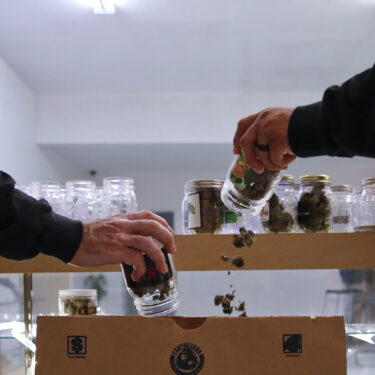Los Angeles reporter Mike Blood obtained an exclusive interview with a licensed cannabis grower whose business simultaneously — and illegally — sells into the illicit market in order to turn a profit, highlighting the financial desperation within the nation’s largest legal marijuana marketplace.
It wasn’t supposed to be like this. When Californians voted in 2016 to broadly legalize the production and sale of marijuana, the main selling points for passage were that legalization would largely dismantle the illegal pot economy while quickly generating over $1 billion in tax dollars. Five years later, industry executives say the multibillion-dollar market is near collapse, with many businesses unable to turn a profit because of heavy taxation and regulation, while the illegal market still is booming and grabbing most of the sales.
As California enters its fifth year of broad legal marijuana sales, industry experts say a growing number of license holders are secretly operating in the illegal market — working both sides of the economy to make ends meet. https://t.co/w1HRz0vQOj
— The Associated Press (@AP) January 16, 2022
Frustration is widespread and in recent months Blood began hearing more about companies straddling both markets to survive. Blood,who has covered the legal market since its inception,went to a trusted industry source with his pitch: He wanted to tell the story of the market turmoil from the inside,with a personal account of a company that is simultaneously a legal player and an outlaw.
Eventually,he was connected with a licensed grower who gave multiple interviews over more than a month,divulging the business’s secret — it simultaneously sells into the underground market to stay alive. “We basically subsidize our white market with our black market,” the grower told Blood. The grower also explained how the state’s tracking system — supposedly following plants from seed to sale — can easily be sidestepped.

Blood told the grower’s story,placing it in the larger context of the nation’s halting steps toward federal legalization. He also obtained photos of the cultivator’s operation,showing budding plants that would soon be sold, legally or not.
The Only on AP story scored a top spot for reader engagement and received prominent play in a wide variety of news publications and digital sites in California and beyond,including front-page placement in The Sacramento Bee,a rarity for an AP story out of California. It was also featured in a number of cannabis industry media outlets,including The State of Cannabis NewsHour daily podcast.
For a counterintuitive report on this unexpected consequence of marijuana legalization, Blood is AP’s Best of the Week — Second Winner.
Visit AP.org to request a trial subscription to AP’s video,photo and text services.
For breaking news, visit apnews.com




